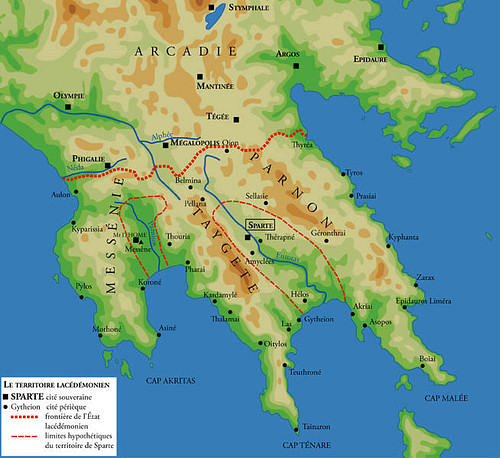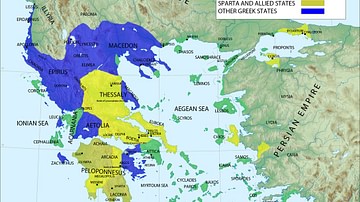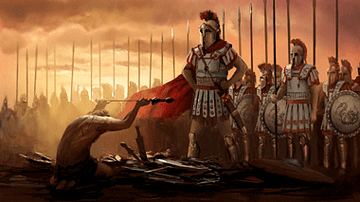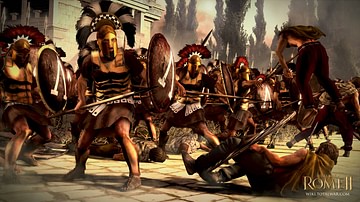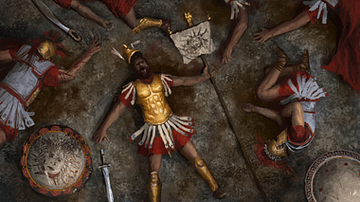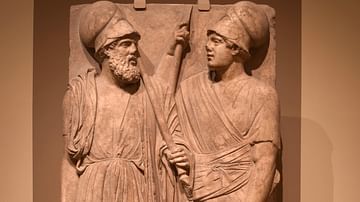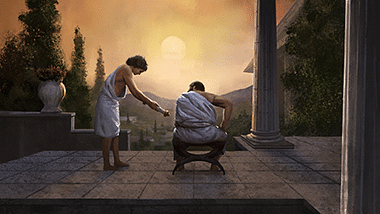
Agesilaus II (c. 445 – 359 BCE) was a Spartan king who won victories in Anatolia and the Corinthian Wars but who would ultimately bring total defeat to his city through his policies against Thebes. When Sparta lost the crucial battle of Leuctra in 371 BCE, it brought an end to the city's long-held dominance of the Peloponnese. Agesilaus was one of the longest-serving and most powerful kings in Spartan history and, thanks to his friendship with the historian Xenophon, his reign is one of the best documented. He is also the subject of one of Plutarch's Lives biographies.
Early Life & Career
Agesilaus was the son of Archidamus II and so a member of the Eurypontid line of Spartan kings. Agis II, the half-brother of Agesilaus, was the heir to the throne and so the latter was given the custom military education (agoge) of an ordinary male citizen. Plutarch informs us that Agesilaus was born with a lame leg but did not let this hinder his training. In 400 BCE, when Agis' son Leotychidas was looked over following rumours that his father was actually the Athenian general Alcibiades, Agesilaus was unexpectedly made king; an event facilitated by the powerful general Lysander, his lover (erastes) when a young man.
Famously using patronage as a means to ensure loyalty from the Spartan elite, Agesilaus also managed to diminish the influence of the second Spartan kings from the Agiad line with whom he co-ruled. Despite his growing power, the king would gain a lasting reputation for his simple lifestyle and self-discipline, for as Plutarch said, 'it would have been hard to find a soldier who slept on a harder bed than the king' (38). Agesilaus was also known for his piety and the fact that he was one of the very few Greek rulers who campaigned abroad and remained uninfluenced by foreign customs and true to Spartan traditions.
Campaigns Against Persia
Agesilaus' first prominent military role was an expedition to Anatolia where he was given the task of liberating the Greek cities from Persian rule. This was the first time that a Spartan king had led an army in Asia and the first occasion when a king had commanded both the land and sea forces. Before setting off Agesilaus wanted to make a religious sacrifice at Aulis just like Agamemnon had done before the Trojan War but he was refused by the Thebans, archenemies of Sparta. This incident would add further fuel to Agesilaus' life-long hatred of Thebes.
Victories against the Persian satraps Pharnabazus and Tissaphernes, notably at the battle of Sardis in 395 BCE, were interrupted when Agesilaus was recalled to mainland Greece to defend Spartan interests. This was perhaps just as well because Sparta had suffered a serious naval defeat at the battle of Knidos in 394 BCE. The Persian fleet had been commanded by Conon while the Spartans were led by the incompetent Peisander who was probably only given the command because he was a relative of Agesilaus.
Campaigns Against Corinth & Thebes
During the ensuing Corinthian Wars, Agesilaus won, albeit at great cost, the battle of Coronea in 394 BCE against a coalition force led by Thebes which included troops from Athens and Corinth. The two armies, in a contest that Xenophon, an eye-witness, described as 'quite unlike any other in our time' (4.3.15), clashed and both sides' right flank defeated their opposition's left flank. Then the Spartan and Theban hoplites turned on each other in a bloody battle in which Agesilaus was himself wounded several times. With the battle won, the Spartan king then spared the lives of a group of enemy soldiers who had sought refuge in a temple, he set up a victory monument and dedicated a tenth of the spoils at Delphi.
More victories came between 391 and 388 BCE in the area around Corinth and Acarnania where Agesilaus demolished the fortifications of Corinth and devastated the countryside, uprooting every tree his army came across. However, the Thebans and their allies were ultimately defeated not by a land force but by a Persian-funded fleet led by the Spartan admiral Antalcidas. It was he who established the King's Peace (aka Peace of Antalcidas) which guaranteed a certain level of political autonomy to the defeated city-states.
Agesilaus controversially ignored the terms of the peace treaty and established pro-Spartan oligarchies at Mantinea, Olynthus, and Phlius. The Spartan king then supported the occupation of Thebes in 382 BCE and the establishment of a garrison there by Phoibidas, which rankled the Thebans enormously. This action and the controversial acquittal of Sphodrias, who had been accused of trying to take over Athens' port the Piraeus and who just happened to be the father of the lover of Agesilaus' son, outraged many Greek city-states, and another anti-Spartan coalition was formed only this time with the financial backing of Persia. More battles followed and Agesilaus gained some victories in Boeotia in 378 and 377 BCE, but mighty Sparta was losing its grip on its own coalition the Peloponnesian League, and Thebes was about to enter its most dominant period in history.
![Greek Hoplites [Artist's Impression]](https://www.worldhistory.org/img/r/p/500x600/4820.png?v=1653899588)
At a peace conference in 371 BCE, Agesilaus famously upset the Theban leader Epaminondas when he refused to accept that the latter was representing all of Boeotia and not just Thebes. War followed and Sparta was defeated at the battle of Leuctra in 371 when Epaminondas and his able general Pelopidas shocked the Greek world. According to Xenophon, Agesilaus was not at the battle as he suffered a relapse of his leg problem which had originally kept him from the battle of Tegyra in 375 BCE (which Sparta also lost) when a blood vessel had burst in his one good leg. Instead, at Leuctra the Spartan forces were led by the other Spartan king Cleombrotus. As a consequence of defeat, Sparta lost the region of Messenia in the Peloponnese and began a steady decline from which the city would never recover.
Career After Leuctra
While historians have blamed Agesilaus' aggressive policies and irrational hatred of Thebes for Sparta's decline, the king was not unpopular at home and continued to hold high office well into his eighties, defending the city from Theban attacks in 370 and 362 BCE. In between he had fought for Ariobarzanes, the Persian satrap in Anatolia in 364 BCE, and he performed a similar service for Nectanebis III in Egypt between 361 and 359 BCE. Both positions brought victories and helped increase the impoverished Spartan treasury. During the return home from Egypt, Agesilaus died at Cyrenaica in Libya in 359 BCE; his body was embalmed in wax and taken back to Sparta for burial.
Agesilaus was a gifted politician and the most powerful man in Greece for much of his rule but perhaps his ambiguous character and portrayal in history is best summed up by Plutarch, 'he was too generous not to give credit to his enemies if they were in the right, but he could not bring himself to condemn his friends if they were in the wrong' (28). The Spartan had been a charismatic leader, had gained more political power than most of his predecessors, and been an effective field commander but perhaps was unlucky to have been king just at a time when Sparta suffered from a declining population and increasing unrest from its helot servile agricultural class. These two factors combined with the rise of an aggressive Thebes intent on creating its own empire meant that Agesilaus oversaw the end of mighty Sparta as one of Greece's superpower states.
